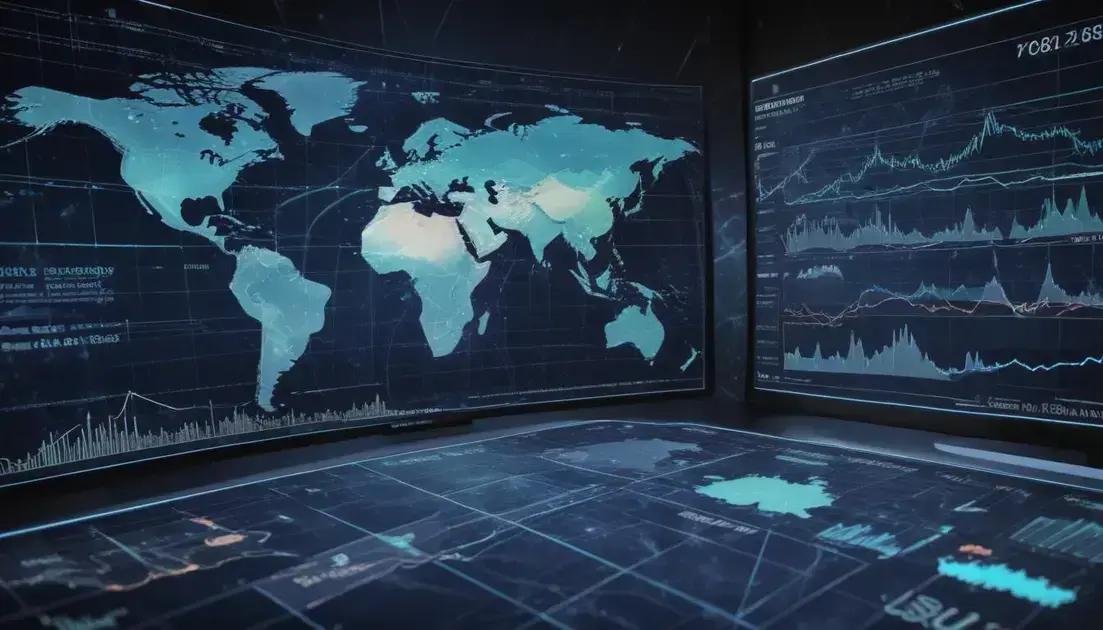IMF framework: unlocking global economic strategies and insights

The IMF framework stands as a critical pillar in global economic management, offering a comprehensive approach to international monetary cooperation and financial stability. Have you ever wondered how countries navigate complex economic challenges on a global scale? This framework provides unique insights into economic policy, lending strategies, and international financial governance.
Understanding the core principles of IMF framework
The International Monetary Fund (IMF) operates on fundamental principles designed to promote global economic stability and cooperation. At its core, the IMF framework is built upon several critical pillars that guide international monetary interactions and financial governance.
Multilateral Collaboration
The primary principle revolves around facilitating economic collaboration between member countries. By creating a platform for dialogue and mutual understanding, the IMF ensures that nations can address financial challenges collectively, preventing isolated economic crises from escalating into global disruptions.
Economic Surveillance
Another crucial aspect of the IMF framework is continuous economic monitoring. Member countries undergo regular assessments of their economic policies, exchange rates, and financial systems. This proactive approach helps identify potential risks and recommend preventive strategies before significant economic challenges emerge.
Financial Stability Mechanisms
The framework establishes robust mechanisms for maintaining global financial stability. This includes providing emergency lending facilities, offering technical assistance, and developing policy recommendations that help countries navigate complex economic landscapes.
By maintaining transparent, rules-based interactions, the IMF framework serves as a critical stabilizing force in the interconnected global economy, promoting predictability and reducing systemic financial risks.
Historical evolution of international monetary systems
The evolution of international monetary systems represents a complex journey of economic adaptation and global cooperation, spanning several transformative periods in world history.
Pre-World War Era
Before the 20th century, the gold standard dominated international monetary interactions. Countries pegged their currencies directly to gold, creating a relatively stable but rigid global financial framework. This system allowed for predictable exchange rates and encouraged international trade, but also limited monetary policy flexibility.
Bretton Woods System
The landmark 1944 Bretton Woods Conference marked a significant turning point. Recognizing the limitations of the previous gold standard, world leaders established a new monetary system where the US dollar became the primary reserve currency, indirectly linked to gold. This system provided more economic stability and facilitated post-World War II reconstruction efforts.
Transition to Floating Rates
By the early 1970s, the Bretton Woods system collapsed, leading to a new era of floating exchange rates. Countries began allowing their currencies to be valued based on market forces, introducing unprecedented monetary flexibility but also increased economic uncertainty.
Modern international monetary systems continue to evolve, driven by technological advancements, globalization, and complex interdependencies between national economies. The ongoing challenge remains balancing national economic interests with global financial stability.
key roles and functions of the international monetary fund
The International Monetary Fund (IMF) plays a critical role in maintaining global economic stability through multifaceted functions that support international financial systems and member countries.
Economic Surveillance
Monitoring global economic trends is a primary function of the IMF. By conducting comprehensive analyses of national and international economic policies, the fund provides early warning systems for potential financial risks and recommends preventive strategies to mitigate economic vulnerabilities.
Financial Assistance Programs
The IMF offers crucial lending mechanisms to countries experiencing balance of payments difficulties. These financial assistance programs are designed with specific conditionality, helping nations stabilize their economies while implementing necessary structural reforms to promote long-term economic health.
Technical Assistance and Capacity Building
Beyond financial support, the IMF provides critical technical expertise to member countries. This includes training government officials, developing robust economic management systems, and sharing best practices in fiscal policy, monetary regulation, and financial sector oversight.
By promoting international monetary cooperation, facilitating balanced global trade, and supporting sustainable economic growth, the IMF serves as a pivotal institution in maintaining worldwide financial stability and preventing potential economic crises.
Economic surveillance and policy recommendations

Economic surveillance represents a critical mechanism for understanding and managing global financial dynamics, enabling proactive policy interventions and risk mitigation strategies.
Global Economic Monitoring
Comprehensive data collection and analysis form the foundation of effective economic surveillance. The IMF tracks macroeconomic indicators, including GDP growth, inflation rates, employment levels, and trade balances across member countries, creating a holistic view of global economic health.
Policy Recommendation Frameworks
Based on detailed economic assessments, the IMF develops targeted policy recommendations. These strategic guidance documents help countries address structural economic challenges, improve fiscal management, and implement reforms that promote sustainable economic development.
Risk Assessment Mechanisms
Advanced statistical models and predictive analytics enable the identification of potential economic vulnerabilities. By detecting early warning signs of financial instability, surveillance teams can recommend preventive measures that mitigate systemic risks before they escalate into broader economic disruptions.
Through rigorous economic surveillance, international financial institutions create a proactive approach to managing complex global economic interactions, supporting informed decision-making and promoting economic resilience across different national contexts.
Lending programs and financial assistance mechanisms
The IMF’s lending programs represent crucial financial support mechanisms designed to help countries navigate economic challenges and restore financial stability.
Emergency Financial Assistance
Rapid financial intervention is a key component of IMF’s lending strategy. When countries face severe balance of payments difficulties, the IMF provides emergency credit lines that help stabilize their economies, prevent potential financial crises, and support economic recovery efforts.
Conditional Lending Instruments
IMF lending programs are typically structured with specific policy conditions. These conditionality frameworks require countries to implement economic reforms, improve fiscal management, and adopt structural changes that promote long-term economic sustainability and reduce future financial vulnerabilities.
Types of Lending Facilities
The IMF offers multiple lending instruments tailored to different economic scenarios. These include Stand-By Arrangements for short-term balance of payments support, Extended Fund Facilities for more prolonged economic restructuring, and Rapid Financing Instruments for countries experiencing urgent economic pressures.
By providing flexible and strategic financial assistance, the IMF helps countries bridge economic gaps, implement critical reforms, and maintain global financial system stability during challenging economic periods.
Impact on developing and emerging economies
The International Monetary Fund’s interactions with developing and emerging economies represent a complex and transformative dynamic that significantly influences global economic development strategies.
Economic Transformation Strategies
Targeted financial interventions play a crucial role in supporting developing economies. The IMF provides strategic guidance that helps these countries build robust economic infrastructures, improve fiscal policies, and create more resilient financial systems capable of withstanding global economic fluctuations.
Structural Reform Support
By offering technical assistance and conditional lending programs, the IMF encourages comprehensive economic reforms. These reforms target key areas such as governance improvements, financial sector modernization, and infrastructure development, which are essential for sustainable economic growth in emerging markets.
Capacity Building Initiatives
Beyond financial support, the IMF invests in human capital development. Training programs for government officials, economic policymakers, and financial professionals help build local expertise, enabling countries to develop more sophisticated economic management capabilities and reduce dependency on external interventions.
Through strategic support and collaborative approaches, the IMF plays a critical role in helping developing economies navigate complex economic challenges, promote sustainable growth, and integrate more effectively into the global economic system.
challenges and future of global financial governance
Global financial governance faces increasingly complex challenges that require innovative approaches and adaptive strategies to maintain economic stability and promote sustainable development.
Technological Disruption
Digital transformation is reshaping financial systems, introducing unprecedented challenges and opportunities. Cryptocurrencies, blockchain technologies, and digital payment platforms are challenging traditional monetary frameworks, requiring regulators to develop more flexible and responsive governance mechanisms.
Geopolitical Economic Tensions
Emerging economic powers are disrupting established global financial hierarchies. Multipolar economic dynamics create new challenges for international financial institutions, demanding more inclusive decision-making processes and representation of diverse economic interests.
Climate Financial Risk Management
Environmental challenges are becoming critical considerations in financial governance. Integrating climate risk assessments, sustainable finance principles, and green economic strategies are increasingly important for maintaining long-term global economic resilience and addressing potential systemic financial risks.
The future of global financial governance will require unprecedented collaboration, technological adaptability, and a commitment to creating more equitable and sustainable economic frameworks that can respond effectively to rapidly changing global conditions.
The IMF Framework: Navigating Global Economic Complexity
The International Monetary Fund represents a critical mechanism for maintaining global economic stability, adapting to increasingly complex financial landscapes. By providing strategic support, surveillance, and financial assistance, the IMF helps countries navigate challenging economic environments and promote sustainable development.
Understanding the framework’s multifaceted roles reveals the intricate ways international financial governance works to balance national interests with global economic health. From lending programs to policy recommendations, the IMF continues to evolve, addressing emerging challenges like technological disruption, geopolitical shifts, and climate-related economic risks.
As global economic dynamics become more interconnected and unpredictable, the IMF’s mission remains crucial: fostering collaboration, providing expert guidance, and supporting economic resilience across diverse national contexts. The future of global financial governance will depend on innovative approaches, technological adaptability, and a commitment to inclusive, sustainable economic strategies.





